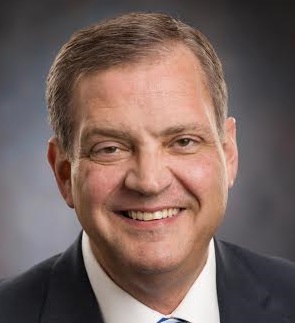By Bob Allen
The president of the Southern Baptist Convention’s flagship seminary said Aug. 18 he is not surprised by news that the school’s mother church has taken a stance of affirming homosexuality.
Albert Mohler, president of Southern Baptist Theological Seminary, said in a podcast that a non-discrimination policy announced by First Baptist Church in Greenville, S.C., puts the historic congregation “at odds with the denomination with which the church had so long been affiliated — the Southern Baptist Convention.”
In addition to being a charter member of the SBC, First Baptist was instrumental in the founding of Furman University. The opening classes of the Southern Baptist Theological Seminary, established in 1859 in Greenville, met in the church’s old sanctuary.
 Mohler said the church’s decision to no longer discriminate on the basis of sexual orientation or gender identity in any area of church life “is not unexpected” for the congregation, which in the 1980s sided with the “moderate” faction in the SBC controversy over biblical inerrancy and formally withdrew from the denomination in 1999, “but it is still tragic.”
Mohler said the church’s decision to no longer discriminate on the basis of sexual orientation or gender identity in any area of church life “is not unexpected” for the congregation, which in the 1980s sided with the “moderate” faction in the SBC controversy over biblical inerrancy and formally withdrew from the denomination in 1999, “but it is still tragic.”
“It reveals the trajectory on which any church, denomination or institution is set if it is untethered to and accountable to a specific set of doctrines in terms of a confession of faith and to, most fundamentally, the inerrancy of Scripture,” Mohler said.
Mohler also criticized the “implausibility” of a statement on the church website claiming the congregation has “made no decision regarding the issue of homosexuality,” because there are members on both sides of the issue.
“We have a congregation that has clearly adopted a statement saying it’s going to welcome same-sex couples, that it will perform same-sex weddings and that it will ordain openly gay ministers, but it says it’s taking no position on homosexuality,” Mohler said. “That is theologically, biblically, morally and even logically incoherent.”
The inclusion policy, adopted officially in May after a yearlong “discernment” process that included congregation-wide listening sessions, was not formally announced to media, but Pastor Jim Dant talked about it in an Aug. 3 feature story in the Greenville News.
“In some ways, it’s going to open up a space for evangelical gay people to have a place again,” Dant said. “There will be a voice of biblical interpretation in the evangelical world that says the way this has been interpreted by the average preacher on AM radio every Sunday is not the only way that evangelicals read biblical literature.”
Since then the story has been picked up both in Christian media and gay-rights advocacy websites. Evangelist Franklin Graham weighed in on Facebook, calling it “disappointing and discouraging” news.
“According to God’s Word, what they are embracing is sin,” Graham said. “The Bible says, ‘Woe to those who call evil good and good evil, who put darkness for light and light for darkness.’”
An Aug. 16 Greenville News letter to the editor said the church needs people’s prayers. “The idea that a gay man can teach a boys’ class is so wrong,” opined reader Nancy Goodwin of Simpsonville, S.C.
First Baptist, Greenville, helped found not only the Southern Baptist Convention in 1845 but also helped establish newer moderate Baptist alternatives to the SBC in the 1980s and 1990s. The church was host for the Alliance of Baptists convocation in 1989, which approved the establishment of Baptist Theological Seminary at Richmond.
The 1994 Alliance convocation, also at First Baptist, Greenville, is where leaders got their first look at a draft of a task force report titled “Rightly Dividing the Word of Truth: A Resource for Congregations in Dialogue on Sexual Orientation.”
A local newspaper headline declaring the group as on record in support of homosexuality prompted concern that the controversy might derail the movement, but later Alliance Executive Director Stan Hastey said in hindsight the sexuality resource was one of the best things the group had ever done.
First Baptist Church in Greenville was originally scheduled to be host church for the Alliance annual gathering in 2005, but that meeting was moved to nearby Furman University because some church members objected after a lesbian minister was invited to preach.
Previous story:
Historic Baptist church adopts gay non-discrimination policy
